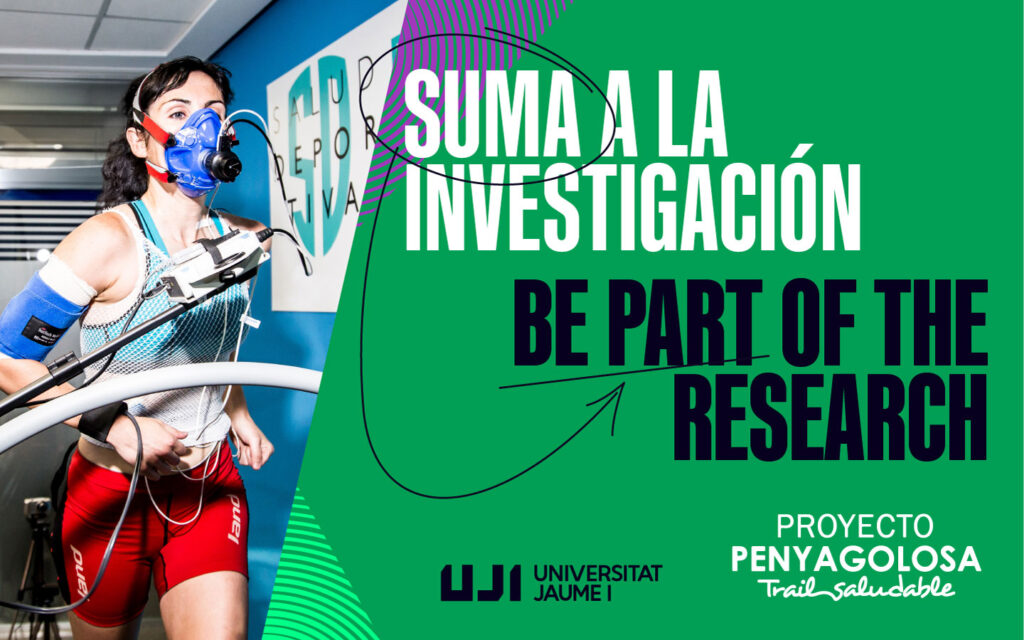
Penyagolosa Trails Women: Focus on Female Athletes
- Training Habits: Analyzing training routines, session intensity and frequency, as well as diet and rest.
- Fitness and Health Status: Physical fitness is assessed using medical tests and blood analyses to identify potential health risks and optimize performance.
- Psychological Factors: Aspects like motivation, stress management, and resilience are studied, as they play a fundamental role in sports success.
- Terrain Impact: Evaluating how ascents and descents affect performance and identifying key factors for effective recovery.
Main Objectives
- Identify Differences: Determining if there are significant differences in effort responses between men and women.
- Improve Health: Using research findings to develop more personalized and effective training and recovery programs to enhance athletes’ health.
- Promote Research: Establishing a research line in Spain to generate high-quality data aimed at improving the health and performance of long-distance runners.
Methodology
The projects involve a comprehensive monitoring of a group of volunteers participating in long-distance races, such as the CSP. Participants undergo various tests and evaluations throughout the process, providing substantial data for analysis.
Project Stages
- Initial Evaluation
- Physical Tests: Strength, endurance, flexibility, and body composition are assessed.
- Clinical Analyses: Blood tests to identify biochemical markers related to health and performance.
- Psychological Evaluation: Questionnaires and interviews to assess motivation, stress, effort perception, and body image.
- Habit Tracking: Participants record training, dietary, and sleep habits over a specified period.
- During the Race
- Physiological Monitoring: Wearable devices measure heart rate, oxygen saturation, and body temperature.
- Sample Collection: Blood and urine samples are taken at different stages of the race to analyze biochemical changes.
- Post-Race Evaluation
- Repeating physical and clinical tests conducted before the race to evaluate changes.
- Questionnaires to assess perceived effort, muscle soreness, and recovery.
- Data Analysis
- Statistical methods identify patterns, relationships, and differences among study groups.
Key Methodology Features
- Multidisciplinary: Involves experts in physiology, psychology, nutrition, and sports medicine.
- Longitudinal: Tracks participants over time to assess long-term changes and establish cause-effect relationships.
- Personalized: Each participant receives individualized monitoring to tailor recommendations to their specific needs.
- Ethical: Strict adherence to ethical principles ensures participant safety and well-being.
This initiative is an extension of the Penyagolosa Trails Saludable project, with a particular focus on women. While the methodologies are similar, specific adaptations address physiological and psychological factors unique to female athletes.
Additional Focus Areas
- Hormonal Factors: Paying special attention to hormonal changes associated with the menstrual cycle and their impact on performance and recovery.
- Body Image and Self-Esteem: Evaluating how these aspects influence motivation and performance in female athletes.
- Specific Needs: Considering women’s requirements regarding gear, nutrition, and training strategies.
Specific Objectives for Women
- Identify Differences: Comparing results between women and men to identify physiological, psychological, and performance differences.
- Optimize Training: Developing training and recovery programs tailored to the specific needs of female long-distance runners.
- Promote Health: Encouraging healthy habits and preventing injuries in female athletes.
Expected Outcomes
These projects are expected to provide valuable insights into the physiology and psychology of long-distance runners, enabling the development of more effective strategies to enhance performance and prevent injuries. Additionally, the findings aim to:
- Highlight women’s participation in endurance sports.
- Develop tailored approaches to female athletes’ training and recovery.
- Strengthen scientific research in endurance sports in Spain.
Publications and Future Research
The results of these pioneering projects are being disseminated through scientific publications to advance knowledge in sports science, with a focus on long-distance running and gender-specific research.
- 1. Abstracts From the Third Annual Medicine & Science in Ultra-Endurance Sports Conference, August 2016, Chamonix, France
- 2. The effect of long-term ultra-endurance exercise and SOD2 genotype on telomere shortening with age
- 3. Hematological variability analysis after road marathon vs ultratrail. Predictive factors
- 4. Impact of Plasma Oxidative Stress Markers on Post-race Recovery in Ultramarathon Runners: A Sex and Age Perspective Overview
- 5. Influence of Female Sex Hormones on Ultra-Running Performance and Post-Race Recovery: Role of Testosterone
- 6. Hydration status, executive function, and response to orthostatism after a 118-km mountain race: are they interrelated?
- 7. Abstracts From the 5th Annual Congress on Medicine & Science in Ultra-Endurance Sports, May 9–10, 2018, Castello ́ de la Plana, Spain
- 8. Effect of mountain ultramarathon distance competition on biochemical variables, respiratory and lower-limb fatigue
- 9. Cardiac Damage Biomarkers and Heart Rate Variability Following a 118-Km Mountain Race: Relationship with Performance and Recovery
- 10. Effects of wearing a full body compression garment during recovery from an ultra-trail race
- 11. Inspiratory and Lower-Limb Strength Importance in Mountain Ultramarathon Running. Sex Differences and Relationship with Performance
- 12. Muscle Cramping in the Marathon: Dehydration and Electrolyte Depletion vs. Muscle Damage
- 13. Ultra Trail Performance is Differently Predicted by Endurance Variables in Men and Women
- 14. Pulmonary and Inspiratory Muscle Function Response to a Mountain Ultramarathon
- 15. Inflammation, muscle damage and post-race physical activity following a mountain ultramarathon
- 16. Pacing and Body Weight Changes During a Mountain Ultramarathon: Sex Differences and Performance
- 17. Is There a Role of Beetroot Consumption on the Recovery of Oxidative Status and Muscle Damage in Ultra-Endurance Runners?
- 18. Evolution of the body mass, height and BMI in participants of the ultra-trail CSP-115
- 19. ¿Qué repercusión a nivel fisiológico puede tener realizar una carrera de ultratrail? Análisis de la alteración de biomarcadores de daño cardiaco y muscular en corredores amateurs de ultratrail
- 20. Variables related to exercise dependence and quality of life in amateur long-distance runners
